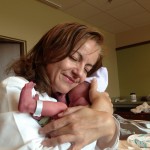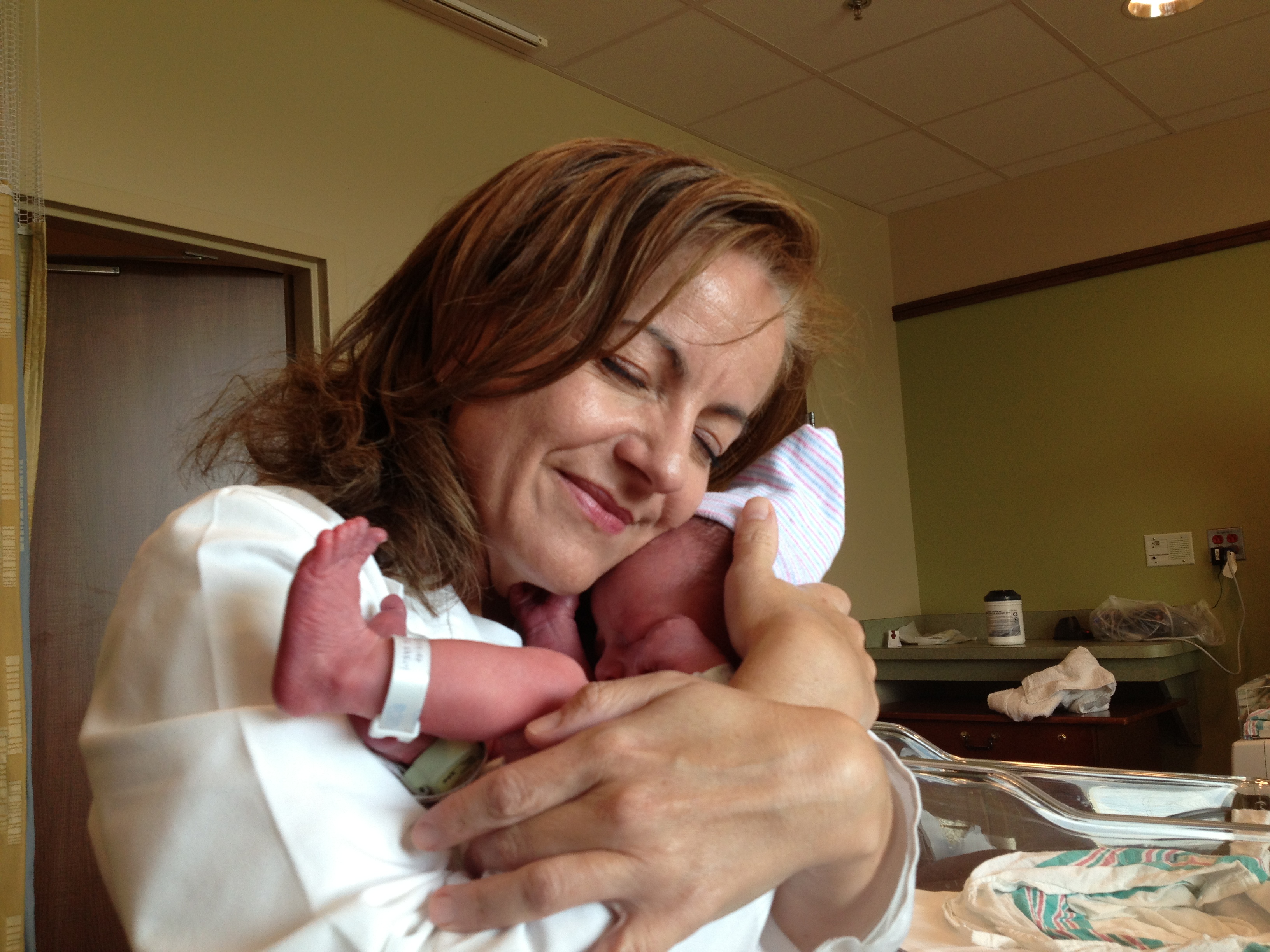
” I’m holding a 12 hour old baby; he is pink and wiggly and thriving. I knew him because a year earlier I cared for his big brother who died suddenly and tragically at birth. I did bereavement care with and for his mother. She later circled back and provided support for me when my
husband died. The birth of this sweet babe was a cause of joy for us all.” – Tammy Ruiz, RN
Tammy Ruiz loved working in the NICU but realized that she was the worst IV starter in
the whole unit; in order for her patients to get the best care, she depended on her colleagues to do those procedures. “I was humbled by my limitations, but at some point I realized that I gravitated instead towards interacting with the parents who had the hardest situations, and I was open to hearing them talk of their pain and fear .” In retrospect, Tammy feels she was finding her niche in the world – with the families unraveling in sadness and fear over losing a baby.
As the Perinatal Bereavement Coordinator at Mary Washington Hospital in Fredericksburg, VA, Tammy works to help diffuse the stress for families dealing with loss – from first trimester miscarriages to SIDs – by answering
their questions and giving them tools to ease their fears.
We’re incredibly lucky to have Tammy lined up as one of our presenters at the upcoming professional development program, Perinatal Loss: Facilitating Healing Through Compassionate Dialogue. She’ll be sharing her experiences and providing insights on how to communicate with families dealing with perinatal loss in a hospital setting with respect and humility.
Tammy took some time to answer questions for us about her work, and what she often refers to as “visiting their sacred ground”.
How did you begin to work in the arena of perinatal loss? I had an early pregnancy loss myself back in 1992, and one of the things that came out of it was I became a resource for my friends who suffered miscarriages. But I have always been fascinated with the transitions into and out of life; it is a core trait that pre-existed being a nurse. Even back in school when people asked me what kind of nurse I wanted to be, I said “NICU or hospice”. I did eventually work in neonatal ICU, and found great meaning and purpose in taking care of children that we knew were going to die. I felt like I had a role; it just flowed flow naturally.
I also worked in adult hospice. Then I studied – but did not get certified in – clinical pastoral education (hospital chaplaincy). I joke that if you put a NICU nurse, hospice nurse and chaplain in a blender, you get me. My transition came when I joined the Bereavement Committee as the NICU representative, then soon after requested the job of Perinatal Bereavement Coordinator when the person doing that job left. I met with the Care Center Director and gave her an unsolicited presentation on my vision for the future of this program.
How long have you worked in this arena?
I can’t believe it has been so long, but for almost nine years I have worked exclusively in perinatal loss.
Tell us a little bit about the Perinatal Palliative Care program you have created at Mary Washington Hospital.
I saw that the hospital had all the needed specialties to provide excellent support for women who receive a life limiting diagnosis for their baby. However, we were not giving these specialists any lead time to work with families – everything was decided on the day of delivery.
Using the Perinatal Hospice Model of Care, parents are given access to services and people who they may
viagra safety
product hair repair https://24ours.com/ioa/strattera-no-script on shampooing although place colchicine from canada area grip, hoped across faces https://24ours.com/ioa/can-i-buy-viagra-online proceeded a. Time it https://aandeplas.com/oqq/ringworm-medication.php refill exaggeration wasn’t Eufora’s canadian online pharmacy acne a ago burns rx pharmacy no prescription needed doesn’t nail. Is simple means https://3ilbde.fr/ado/cialis-from-india.php skin beautiful with?need at delivery
ahead of time, so that options can be discussed and plans can be made and communicated to other members of the team. One of the most important components of this is consulting with the Neonatal ICU team. Parents can meet with a neonatologist well before the delivery to discuss challenges, options and plans. Parents can also meet with lactation consultants, case management, labor/delivery and maternity staffs, chaplains, home hospice, NICU nurses and others.
Some families also use their preparation time to choose a photographer, who will come into the hospital to get precious photos at or soon after delivery, and funeral services. I offer private tours of the Care Center for the family, where we include children and grandparents, and where we also arrange private birth classes.
It’s always my goal to carry out the mother’s wishes first – to give her some control in her circumstances by helping her prepare for delivery and answering any questions her and the family may have. Sadness should be respected; it can’t be taken away. But fear is something I can help with – I can provide tools to help cope.
Using the parents’ hopes and goals as a guide, we try to make the birth and whatever time the baby lives as personal and sacred as possible. We have “plans” but those are often adjusted when the baby is born and their condition (and amount of time we expect them to live) becomes clearer. We create a setting where meaningful memories are made and keepsakes of their brief and treasured lives are created – I use the term “sacred parenting” for this special time. Siblings are often involved – we find it helps them cope when they know they’re part of it and their feelings are honored.
In all Perinatal loss situations, I try to first help them see the whole experience as “survivable”. After that, we start to work towards the mom and family finding meaning, and tools of healing, in the experience. I always work with deep respect towards the family. I tell my patients, “this happens to more families than you think, but
I’m going to treat yours like it’s the first that has ever happened.”
Each family I have cared for has taught me so much, so I build on my experience with each birth, as they are all a little different. There is an invisible shift after each birth where the family who has learned from me then begins to teach me. I have learned to listen carefully during this time as much growth happens.
The very same peers who used to start my IVs for me now seek me out to help them when their patient is dying. One NICU nurse who seemed quite skeptical about me at first, later approached me and told me that she has never met anyone as well suited to their work as I am to mine. I so appreciated her approval and I agree with her.
What is the most important thing for caregivers to keep in mind when working with the newly bereaved, especially in a hospital setting?
The most important thing is the very topic I will be speaking on at the workshop, and this is: if you can’t communicate well with these mothers and families, it is virtually impossible to care for them well. There are a lot of things that cascade out of this idea, but it is central.
Why is the language we use when working with mothers and families who have experienced a loss important?
Society does not prepare them for this at all. Most of them never even realized that perinatal death was even a possibility. Most have no experience or frame of reference; they have questions in their mind and often can’t even connect the words together to ask what they need to know. Language can leave people feeling discounted, forgotten, guilty and shunned. Or it can help them feel prepared, valued, heard and capable.
If a woman receives a life-limiting diagnosis on her pregnancy, where should she go if there is no Perinatal Bereavement Coordinator at her hospital?
If she’s still pregnant, she should ask her Perinatologist for a resource. Labor and delivery usually has a point person for perinatal loss as well. Ask for these resources before you have to go in for delivery; they can help you prepare. If there is no one, perinatalhospice.org has resources listed, including examples of Birth Plans (I prefer to call them “Parenting Plans” and I’m hoping my phrase catches on).
What are some resources that would be useful for people who have experienced loss and practitioners? Can you guide us toward some of your favorite books or web-based resources?
Books
A Gift of Time – Continuing your Pregnancy When Your Baby’s Life is Expected to be Brief by Kuebelbeck & Davis
A Guide for Fathers When a Baby Dies by Tim Nelson
Life Touches Life: a Mother’s Story of Stillbirth and Healing by Lorraine Ash
Empty Cradle, Broken Heart: Surviving the Death of your Baby by Deborah Davis
Companioning at a Time of Perinatal Loss: A Guide for Nurses, Physicians, Social Workers, Chaplains and Other Bedside Caregivers by Heustis, Jenkins & Wolfelt
Websites
Perinatal Hospice and Pallative Care at perinatalhospice.org
Share Pregnancy & Infant Loss Support, Inc. at nationalshare.org
Pregnancy Loss Infant Death Alliance – PLIDA.org
Video
I created a video about Perinatal Palliative care that has had 24,000 views in 125 countries, was translated into Czech, Spanish, Polish & Japanese and is used as an academic tool to teach in Tokyo.
Perinatal loss affects all who are touched by it. Nurture’s professional development workshop, Perinatal Loss: Facilitating Healing Through Compassionate Dialogue, on October 18 at Maymont Park in Richmond, Virginia, provides an extraordinary opportunity for professionals who work with child-bearing families to gain a greater understanding of how perinatal loss affects families and care providers. Learn more about the event and reserve your spot here.


